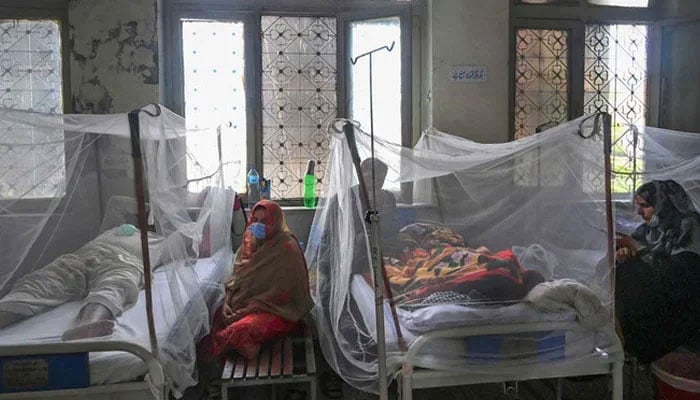Dengue comes early
The mosquitoes that spread dengue tend to thrive after the heavy monsoon rains
Summer is not the only thing to have arrived early this year. Peak dengue season, which usually follows the heavy rains of the monsoon, is still weeks away but already the Islamabad-Rawalpindi area appears to have a serious dengue outbreak on its hands. As many as 38 patients have tested positive for the virus, with an estimated 24 from Rawalpindi district and 14 from the federal capital. Reports say that the early emergence of this large a number of cases indicates the presence of adult Aedes mosquitoes in great numbers in the region and that the area may face a severe dengue fever outbreak in the coming days. The mosquitoes that spread dengue tend to thrive after the heavy monsoon rains as, given Pakistan’s shoddy urban infrastructure, there is a surfeit of stagnant pools of water. These may as well be pools of death as they provide the ideal breeding ground for mosquitoes that like to lay their eggs in stagnant pools of water. This impact is only exacerbated by the rains leading to the peak dengue months of August through October.
However, rains are something the Rawalpindi-Islamabad twin cities and the rest of the country have yet to face, at least heavy ones. Which makes this early spike in dengue puzzling. Aside from stagnant water, humidity and hot weather also have an impact on the spread of dengue which may have played a role in this early spike. It must also be noted that the image that much of the rest of the country has of Rawalpindi-Islamabad as a leafy green area without the problems of other big cities is fast fading. The rapid pace of growth in the region has likely brought many of the problems more established big cities like Lahore and Karachi have to deal with. These conditions have likely played a major role in the early spike as they do when it comes to dengue in general throughout Pakistan. While equipping the healthcare system to deal with the surge in dengue and also equipping homes and workplaces with mosquito nets and repellents are important remedial measures, these will only deal with the immediate problems. Unless Pakistan literally cleans itself up and stops treating its urban areas like open dumping grounds and fixes all those random potholes and ditches, we will continue to lose dozens of lives to dengue every year.
-
 Lana Del Rey Announces New Single Co-written With Husband Jeremy Dufrene
Lana Del Rey Announces New Single Co-written With Husband Jeremy Dufrene -
 Ukraine-Russia Talks Heat Up As Zelenskyy Warns Of US Pressure Before Elections
Ukraine-Russia Talks Heat Up As Zelenskyy Warns Of US Pressure Before Elections -
 Lil Nas X Spotted Buying Used Refrigerator After Backlash Over Nude Public Meltdown
Lil Nas X Spotted Buying Used Refrigerator After Backlash Over Nude Public Meltdown -
 Caleb McLaughlin Shares His Resume For This Major Role
Caleb McLaughlin Shares His Resume For This Major Role -
 King Charles Carries With ‘dignity’ As Andrew Lets Down
King Charles Carries With ‘dignity’ As Andrew Lets Down -
 Brooklyn Beckham Covers Up More Tattoos Linked To His Family Amid Rift
Brooklyn Beckham Covers Up More Tattoos Linked To His Family Amid Rift -
 Shamed Andrew Agreed To ‘go Quietly’ If King Protects Daughters
Shamed Andrew Agreed To ‘go Quietly’ If King Protects Daughters -
 Candace Cameron Bure Says She’s Supporting Lori Loughlin After Separation From Mossimo Giannulli
Candace Cameron Bure Says She’s Supporting Lori Loughlin After Separation From Mossimo Giannulli -
 Princess Beatrice, Eugenie Are ‘not Innocent’ In Epstein Drama
Princess Beatrice, Eugenie Are ‘not Innocent’ In Epstein Drama -
 Reese Witherspoon Goes 'boss' Mode On 'Legally Blonde' Prequel
Reese Witherspoon Goes 'boss' Mode On 'Legally Blonde' Prequel -
 Chris Hemsworth And Elsa Pataky Open Up About Raising Their Three Children In Australia
Chris Hemsworth And Elsa Pataky Open Up About Raising Their Three Children In Australia -
 Record Set Straight On King Charles’ Reason For Financially Supporting Andrew And Not Harry
Record Set Straight On King Charles’ Reason For Financially Supporting Andrew And Not Harry -
 Michael Douglas Breaks Silence On Jack Nicholson's Constant Teasing
Michael Douglas Breaks Silence On Jack Nicholson's Constant Teasing -
 How Prince Edward Was ‘bullied’ By Brother Andrew Mountbatten Windsor
How Prince Edward Was ‘bullied’ By Brother Andrew Mountbatten Windsor -
 'Kryptonite' Singer Brad Arnold Loses Battle With Cancer
'Kryptonite' Singer Brad Arnold Loses Battle With Cancer -
 Gabourey Sidibe Gets Candid About Balancing Motherhood And Career
Gabourey Sidibe Gets Candid About Balancing Motherhood And Career




